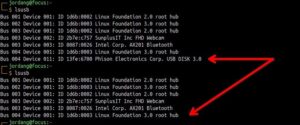Your Linux command line is filled to the brim with commands you can use to learn about and use your device more effectively. Recently, I figured out a few handy uses for the lsusb command.
In case you aren’t familar, the lsusb command gets its name from the ls command you might already be familiar with. ls is short for “list” and of course usb refers to the Universal Serial Bus, the category of computer port we’re all using all the time.
Identify a device’s vendor
Sometimes, when you get a flash drive or a computer peripheral, it’s unclear who the manufacturer is. So-called white label products may have one company’s logo on them, but that company simply bought it from another and stamped it themselves. If you want to find out who the real manufacturer is, otherwise known as the vendor, you can check that with the lsusb command. You’ll see a bunch of devices listed the first time you run it, but if you unplug the device and run lsusb again, you can identify the one you’re investigating because it will disappear in the second readout. For example, here’s an entry I identified for a flash drive I have:
Bus 004 Device 011: ID 13fe:6700 Phison Electronics Corp. USB DISK 3.0
I identified it by noticing it was missing from lsusb’s output after I removed it.
In this case, the vendor’s ID code is 13fe, and lsusb has identified that vendor as Phison Electronics Corp. If I wanted to learn more, or if lsusb for some reason couldn’t produce a vendor name, I could do a web search like “device vendor ID 13fe” and an online database will likely be able to identify it for me and show me other products it produces.
[mai mult...]
